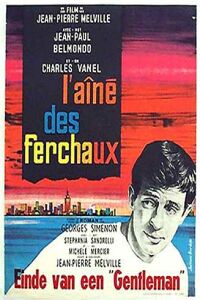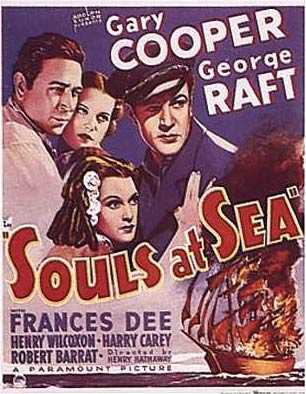
An insufferable film snob wanders off the beaten track, then comes back and talks about what he has seen.
Sunday, May 28, 2006
Saturday, May 27, 2006
Between the Covers
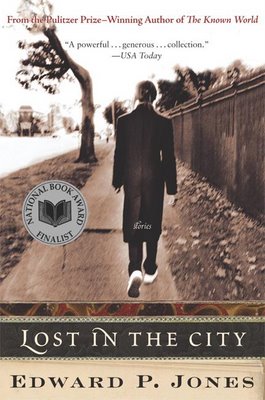
Washington, D.C. is home for the souls who populate Edward P. Jones’ "Lost in the City". It’s a terrific collection of fifteen short stories, and Jones paints his people with quick, powerful strokes. There’s the sharp, mouthy Cassandra with her stolen car in "The Night Rhonda Ferguson was Killed". There’s Caesar, the young hood who is at the center of "Young Lions." And there’s Horace, the vain widower who lets his life careen out of control in "A Rich Man."
The stories all revolve around black families in D.C., and many of them are set in the fifties and early sixties. These are not necessarily harsh stories of big city life, although that reality is always simmering in the background. Jones weaves a story out of something as simple as a child’s first day of school ("The First Day") or a chance meeting with a dreadlocked man at the subway station ("An Orange Line Train to Ballston")
"One night, all of us - me, Lonney and his mother and Brenda and her parents – were sitting arouind his living room, talking about the wedding and everything. Someone knocked on the door and Lonney opened it. It was his old man, standing right there tall and straight as a lamppost in his uniform. You know something’s wrong when a man doesn’t even have a key to his own house."
From "The Store"
A nod to Lance Mannion, who made me want to read this.
Thursday, May 25, 2006
Cyclo
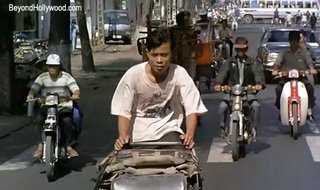 The Cyclo boy is young – he looks like a kid who might deliver your paper. You watch him for a while, and it occurs to you that while he’s just a kid, he isn’t youthful. There’s not even a hint of carefree childishness or immaturity.
The Cyclo boy is young – he looks like a kid who might deliver your paper. You watch him for a while, and it occurs to you that while he’s just a kid, he isn’t youthful. There’s not even a hint of carefree childishness or immaturity.
This starts to make sense when we meet the rest of his family. He lives with his elderly grandfather who goes out every day and repairs bicycle tires, even thought his health is failing. There’s an older sister who carries pails of water to restaurants for a living. And there’s a young sister of not more that 7 or 8 who has her own full-time job shining shoes.
"Cyclo" is set in Ho Chi Min City, Viet Nam, and it is the story of the Cyclo boy and his sister and how poverty forces them into crime and degradation.
The opening shot in the film is a head-on shot of the Cyclo boy at work. A "cyclo" is a bicycle taxi, and the boy is following in the footsteps of his father, who also drove one, and was killed by a car. The film is light on narration – we just watch him work, and this accomplishes two things – First, we see how difficult the job is, and second, we get a sense of the city he lives in.
Ah, yes, the city. Very seldom has a city looked grungier and more inhospitable than here. There’s a scene early on where the cyclo boy is threatened by others for working on their turf. His boss, who is known only as "The Madam" warns him that other gangs are protective of their areas.
One day, while stopping to have a leak, his cyclo is stolen, and in trying to get it back he gets beaten up. He reports this back to the Madam, and to enable him to pay for the cycle, he is put under the direction of a gang leader known as "The Poet." His indoctrination into gang life is a harsh one. One day the rest of the gang takes him to watch the handiwork of a man known only as Mr. Lullaby. Mr. Lullaby has some poor unfortunate soul tied to a chair with his face covered in clear tape, and after a bit of banter, slits the man’s throat. The Cyclo boy is sickened by this, but the killer makes him a gift of his switchblade, and the Cyclo boy lays in bed with it that night, touching his face with the knife in a strange fetishist manner.
The older sister, meanwhile, has also drifted into the orbit of the Poet. She becomes a whore, and her encounters with clients are perverse, and again, deeply fetishist. One man forces her to drink water, so he can watch her pee. Another has a foot fetish, and has her put on nylons, which he proceeds to cut off with scissors.
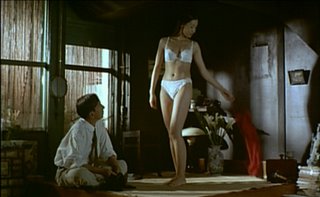
One day the Cyclo boy sees one of the toughs who stole his bike, and tells the rest of the gang. The response surprises him - "He works for the Madam, too" This is never really explored, but it raises the possibility that the bike was stolen just to get a young recruit into the illegal portion of the business.
One night the sister is taken to a fancy disco, and hired out to a wealthy yuppie. The following day, she is beaten and bloody, and one of the other whores sceams at the shaken Poet.
"You bastard! She was a virgin!"
The film cuts directly the roof of a building, where the Poet murders the violent john in a long and relentlessly bloody scene.
The Poet is the enigma of this film. There have been indications that he loves the sister, and the murder would seem to reinforce that, but it’s hard to tell. Like everyone else in the film, the Poet says very little. In any case, it’s safe to say that the rape and murder affect him deeply, because he goes home and torches his place with him still in it.
There is a recurring image of things covered with paint in this film. The Madam has a retarded son who covers him self in yellow paint. The Poet gets nosebleeds, and at one point drops of his blood fall on a white flower. The Cyclo boy tries to calm himself with pills and booze before doing a job, and instead ends up covering himself with blue paint as across the street, the Poets’ apartment goes up in flames.
"Cyclo" is peculiar and difficult film. As I mentioned above, dialogue is scarce, and we are not allowed to get too close to the characters. Cyclo boy, his sister, and the Poet live in a world where life starts out tough, and sometimes gets worse. There is an astounding shot toward the end of the film, where the camera pans over tennis courts, and a swimming pool filled with affluent types, before moving down to the street and picking up the Cyclo boy and his family on a new cycle taxi. The narration tells a story about how the family’s cat came back, and there’s an obvious parallel to the family, which went through a harrowing ordeal and managed to come out the other side. They know the truth, and they would likely tell those people playing tennis – yeah, I’ve been to Hell – It’s just around the corner.
Saturday, May 20, 2006
Wednesday, May 17, 2006
Goin' Down the Road
The main characters in Donald Shebib’s 1970 landmark "Goin’ Down the Road" are such people. Peter McGraw and Joey Mayle are packing their car when we first meet them, and they don’t have any doubt in their minds – They’re going to conquer Toronto. They have that youthful piss-and-vinegar- I’m bulletproof aura, and as they drive, they let us in on their plans. They have a place to live lined up with a distant aunt, and jobs waiting for them courtesy of a fellow Nova Scotian.
Their plans hit a couple of snags early on. At the aunt’s house the occupants don’t even open the door, and watch the strange newcomers from behind the drapes. It’s obvious that nobody told THEM they would be having houseguests. Then, a phone call about their jobs comes up dry as well. The first night in Toronto is spent at the Salvation Army. It’s here that some doubt starts to set in, as Joey remarks "Maybe we should go back home, Pete." Pete is having none of that, and shows him a classified page with dozens of jobs. He remarks "I’d like to work in an office. I’d have a secretary…my name on the door."
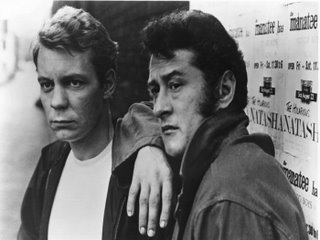
The following day marks the beginning of their job search, and we follow Pete as he goes to an interview at an advertising agency. A condescending executive questions Pete and we feel as awkward as he does. The exec remarks "What made you want to apply here?" Joey is more realistic, and at the end of the day, he informs Pete that he has gotten a job loading cases of pop, and that Pete should go and apply, too.
The boys now have jobs, and watching them work, we think that this isn’t likely much better than what they’ve left behind. Pete certainly doesn’t think so, either, and says as much.
Pete also decides that he has an eye for the sexy Nicole, who comes in a couple of days a week. The other guys in the plant lust for her, but all think she’s unattainable. Pete manages to wangle a date with her, but the date consists of her dancing with her friends, and him sitting alone drinking in the corner. After dropping her off at home, Pete sees the rest of the guys spying from the parking lot, and hides in the entrance of the building rather than have them know he hasn’t slept with her.
Meanwhile, Joey has fallen in love with a waitress named Betty, and things move pretty quickly. He reveals to Pete that she is pregnant and that he is going to marry her.
We see Pete visiting the couple at their new apartment, and he remarks on all the new stuff they have. Joey proudly tells of the great deal he got, and that he doesn’t have to pay a cent until months later. This recklessness makes us cringe, and predictably enough, the two get laid off at the plant. Sinking into poverty, Joey and Betty (and Pete) move into a run-down apartment, and do whatever they can to survive - Washing cars, setting pins at a bowling alley, delivering newspapers.
There’s a terrific sequence where we watch the boys delivering newspapers. They eventually just say he hell with it, throw the papers away, and engage in a snowball fight, while Bruce Cockburn sings on the soundtrack:
"Just where do you belong, I’d like to know?"
As if in response, the film shows them quietly watching a ship on Lake Ontario at the end of the sequence.
There is a sad inevitability to the story, and we eventually find Pete and Joey at a supermarket filling a cart with groceries. They have a pathetic plan to steal the food, and an encounter with a perceptive clerk ends in violence. With no money, no prospects, the police now looking for them, a baby on the way, the boys come at a crossroads.
I will not spoil the finale for you, except to say that it is remarkable in its’ sadness and beauty. If you go back to the start of the film, Peter was the enthusiastic one, and Joey had his doubts. At the end of the film, we realize that the roles have reversed. Peter is pretty happy with their solution, but not Joey. Joey won’t be happy for a long time to come.
Saturday, May 13, 2006
Tuesday, May 09, 2006
Sullivan's Travels
The Sullivan is John L Sullivan (Joel McRae), successful Hollywood film director. As the film opens, Sullivan is trying to pitch his new picture "Brother, Where Art Thou" to two studio types. They are skeptical, because Sullivan’s stock in trade is the light romantic comedy, and the new movie is supposed to be a serious social drama.
"I want this to be a picture of dignity…a true canvas of the suffering of humanity!" One of the studio execs snorts "What do you know about suffering?" and that stops Sullivan in his tracks. He has to admit that he doesn’t know anything and that hatches an idea in his head – He’ll pose a bum, and go out in the world to see how the poor live. This will give him the credibility to make his movie.
 Thus we see Sullivan the next day walking down the road in hobo gear – followed by a fully furnished motor home filled with studio personnel. Sullivan hitches a ride with a young kid in a dune buggy and tries to lose the entourage. This sequence is a marvel of slapstick comedy as the motor home tries to keep up to the speeding dune buggy, and is reduced to a shambles in the process.
Thus we see Sullivan the next day walking down the road in hobo gear – followed by a fully furnished motor home filled with studio personnel. Sullivan hitches a ride with a young kid in a dune buggy and tries to lose the entourage. This sequence is a marvel of slapstick comedy as the motor home tries to keep up to the speeding dune buggy, and is reduced to a shambles in the process.
This fiasco just strengthens Sullivan’s resolve and he is able to convince the studio that they don’t have to have him followed. So off he goes again. We next see him chopping wood for a couple of women, and it soon becomes clear that the women don’t want him exclusively for chores, going so far as to lock him in his room. He makes his escape with that oldest of movie clichés – The rope made of bedding.
A breakfast stop at a roadside diner leads to a meeting with a down-on-her-luck wannabe actress (Veronica Lake), and the two strike up a friendship over coffee. What’s marvelous in this scene is the way that Sullivan keeps his secret from the girl, despite the fact that he really, really wants to tell her who he is.
"Give me a letter of introduction to Lubitsch."
"I might be able to do that – Who’s Lubitsch?"
The girl decides to go along with Sullivan on his travels (She knows the truth by now), and he starts making plans to jump a freight train. There’s a terrific moment when Sullivan’s butler calls the railroad office. "If a hobo were going to jump on the 5:48 train, where should he do it from?"
With Sullivan and the girl hopping trains and travelling around the country, Sturges takes a step back and lets us experience the journey as they do. We see hobos everywhere, sleeping outdoors and grabbing meals where they can. The Depression was still fresh in everyone’s minds in 1941, and we are quietly reminded of the devastation it caused.
This trip gives Sullivan the experience that he thinks he needs, but he makes the fateful decision to go out one last evening and distribute money to the tramps. The result is that he is beaten, robbed, and thrown unconscious onto a freight train. To top it all off, a violent altercation with a railway worker gets him thrown in jail.
Sullivan’s stint in jail leads to the scene that is the centerpiece of the film, when the convicts go to a "picture show" at a black church. They march in slowly, in chains, to the sounds of the congregation singing. The lights go down, and the audience is treated to a Disney cartoon of Pluto fighting a losing battle with a sheet of flypaper. The convicts roar with laughter and eventually so does the movie director who was tired of making comedies.
John L. Sullivan the director comes to realize that there isn’t anything wrong with giving people something to laugh at. Preston Sturges the director has it both ways. His films are textbook slapstick comedies, with pies in the face and people falling into rainbarrels, but he also dished out a little medicine with the sugar.

